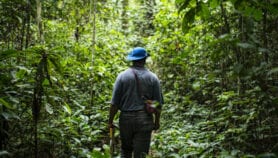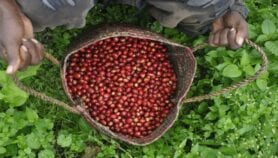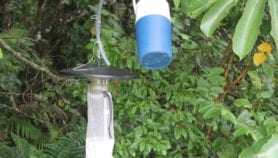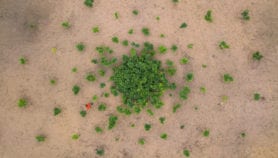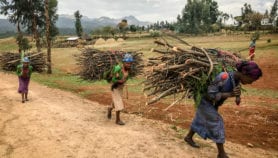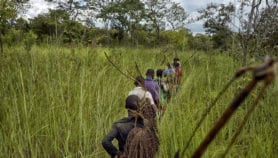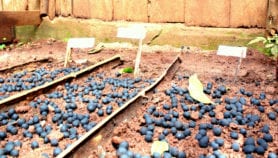Send to a friend
The details you provide on this page will not be used to send unsolicited email, and will not be sold to a 3rd party. See privacy policy.
Below is a round up of news from or about Sub-Saharan Africa for the period 8–22 November 2007.
Senegal study endorses artemisinin combination therapy for malaria
A six-year study in southern Senegal has endorsed the long-term use of artemisinin-based combination drug treatment to treat routine malaria. Researchers concluded in the journal Malaria that the WHO’s recommendation was ideal for moderate to high-risk regions. More>> ![]() [341kB]
[341kB]
Ministers recommend pesticides regulation committee for West Africa
Ministers of food and agriculture from the Economic Community of West African States (ECOWAS) have adopted a five-year action plan for the development of biotechnology and biosafety in the region. More>>
Farmers ‘have little incentive for green efforts’
Agroforestry researchers in Malawi and Mozambique say existing policies might penalise farmers for environmentally healthy choices such as ‘fertiliser trees’, which also protect against seasonal food insecurity. Their paper, published in the African Journal of Environmental Science and Technology, analyses a decade of research in Southern Africa. More>> ![]()
![]()
![]()
![]()
![]()
![]()
![]()
![]()
![]()
![]()
![]()
Insecticide spraying left Botswana birdlife untouched
Use of the insecticide deltamethrin to control the tsetse fly, which spreads sleeping sickness among humans and livestock, did not affect the food sources for bird flocks in the Okavango Delta, Botswana. Research published in the African Journal of Ecology looked at the effects of spraying in the delta during 2001 and 2002. More>>
Managing pain in developing countries
Pain management in developing countries has not been neglected because of cost, argues Olaitan Soyannwo, of the University of Ibadan in Nigeria, and colleagues in the journal Anaesthesia. The drugs are inexpensive, they say — the problem lies in the fact that appropriate healthcare systems are not in place. More>>
Agriculture investment value for money
Agriculture is a good investment, contributing significantly to many African economies, highlights a report from the UN Food and Agriculture Organization. The report suggests that both donors and governments prioritise urban constituencies, despite a 2003 vow from heads of state to raise agriculture and rural development to ten per cent of national budgets by 2008. More>> ![]()
![]()
![]()
![]()
![]()
![]()
![]()
![]()
![]()
![]()
![]()
HIV/AIDS counselling and testing ‘exhausting’ South Africa’s nurses
Voluntary counselling and testing for HIV patients in the Limpopo region of South Africa is so exhausting that nurses are leaving the profession, with 20 nurses remaining of the 300 trained since 2001. The conclusions were made by South African researchers in a study published in Nursing & Health Sciences. More>>
Potential biocontrol agents in South African soil
New antibiotic-producing organisms have been found in the forest soil of the KwaZulu-Natal region of South Africa. Researchers report in the South African Journal of Science that the rare types of soil bacteria may be commercially significant given current trends away from chemical treatment of plant diseases. More>> ![]()
![]()
![]()
![]()
![]()
![]()
![]()
![]()
![]()
![]()
![]()
Mozambique biofuel debate requires further thought
Biofuels and food security in Mozambique are examined in this IRIN article. An ongoing World Bank study on the feasibility of biofuels in Mozambique notes that food security depends far more on a farmer’s capacity to work the land than the availability of land itself. Almost all the country’s farms consist of small family plots, of which only four percent use fertiliser and six percent have irrigation. More>>
Chemistry’s role in development in Africa
Chemistry’s role in providing sustainable agriculture and human health for Africa is the focus of the 13th conference of Chemical Research Applied to World Needs, a standing committee of the International Union of Pure and Applied Chemistry. The conference will be held at Stellenbosch University in South Africa from 2–5 December. More>> ![]()
![]()
![]()
![]()
![]()
![]()
![]()
![]()
![]()
![]()
![]()


